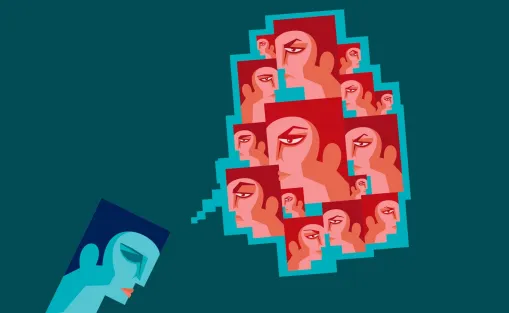
Healing the Inner Critic in Relationships | Understanding Ear
In the quiet moments between conversations, in the pauses after conflict, and in the silence that often follows intimacy, another voice tends to emerge, the inner critic. It is that persistent, often unnoticed narrative that says, “You’re not enough,” “You always mess things up,” or “If they really knew you, they wouldn’t stay.” This voice may not shout, but it shapes how we show up in relationships, how we react, and ultimately, what we believe we are worthy of receiving.
For many individuals and couples Vanessa Cardenas works with at Understanding Ear, the journey toward healing does not begin with what was said in the relationship, but rather what was already being said internally long before betrayal, disconnection, or disappointment occurred.
Understanding the Inner Critic’s Role in Relationships
The inner critic is not born from malice. It is often formed from early experiences, conditioning, trauma, or relationships where love was conditional and validation was scarce. Over time, it becomes the lens through which we interpret love, conflict, and closeness. This critical voice may sound like self-protection, but it often prevents authentic connection by encouraging withdrawal, self-sabotage, or people-pleasing.
In romantic relationships, the inner critic can manifest as:
a. Constant fear of being abandoned or misunderstood, leading to over-apologizing or emotional overcompensation.
b. Difficulty trusting your partner's love or sincerity, even when they are showing up consistently.
c. A habit of anticipating rejection, which causes preemptive distancing or defensive behavior.
d. Replaying arguments or perceived failures long after a partner has moved on, because internally, you have not.
The Cost of Leaving the Inner Critic Unchecked
Left unchallenged, the inner critic not only damages self-worth, it distorts how we interpret others’ actions. A gentle request from a partner may feel like criticism. A busy day might feel like abandonment. The mind becomes a filter that turns neutral moments into emotional evidence of inadequacy.
This cycle is especially harmful for individuals healing from betrayal or emotional trauma. As Vanessa often sees in her betrayal recovery coaching sessions, the internal story can become harsher after relational wounds. Clients may internalize the betrayal as a reflection of their value, wondering, “What did I do wrong?” or “Why wasn’t I worth honesty?”
But here is the truth: the betrayal is not a mirror of your worth, but of another person’s choices.
Rewriting the Narrative: From Criticism to Compassion
Healing begins when we recognize that the voice within us is not always telling the truth. And unlike the past, we have the power to respond, reframe, and choose differently now.
a. Identify the Inner Critic’s Script
Pay attention to the automatic thoughts that arise in moments of emotional stress. Write them down. What themes appear? Do you notice patterns of unworthiness, fear, or comparison?
b. Name the Origin
Often, the inner critic echoes voices from childhood, past relationships, or societal pressures. Naming where the belief originated helps create distance between that story and your current reality.
c. Replace Criticism with Compassionate Dialogue
Instead of “I always ruin things,” try “I made a mistake, but I’m still worthy of love.” This is not about blind positivity, but about creating space for self-acceptance. One of Vanessa’s favorite exercises involves writing a supportive letter to oneself, as though it were coming from a trusted friend or mentor.
d. Seek Connection, Not Perfection
The goal in relationships is not to show up flawlessly, but to show up honestly. When we silence the inner critic, we give ourselves permission to be vulnerable, to express needs, to ask for support, and to love without conditions.
Creating New Relational Patterns Through Self-Compassion
Rewriting your inner narrative is not only a personal transformation, it is relational. As you build a more compassionate relationship with yourself, your outer relationships shift. You stop choosing partners who mirror your self-judgment. You communicate with clarity instead of shame. You respond instead of react.
At Understanding Ear, Vanessa Cardenas supports clients through this transformation with highly personalized relationship coaching, whether through in-person sessions in Westchester County or virtual coaching for those navigating healing from a distance. If you’re wondering where to begin, start here to explore how Vanessa’s approach can meet you where you are.
Final Thoughts: The Voice You Choose Matters
You are not the voice of your inner critic. You are the one who hears it. And just as we learned to speak to ourselves with harshness, we can learn to speak with kindness. Healing begins not when others validate our worth, but when we stop questioning it. If you are ready to break free from patterns of self-sabotage and rewrite the story you tell yourself, reach out to Vanessa Cardenas today.
Through expert guidance and compassionate insight, you will learn how to reconnect with yourself, your partner, and the kind of love you know deep down you deserve.
Contact Information:
Vanessa Cardenas
Relationship Reset Expert
Email: [email protected]
The Atrium at Charles Point
8 John Walsh Blvd., Suite 406B
Peekskill, NY 10566
(Westchester County)
Contact Vanessa

